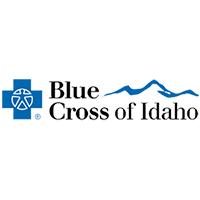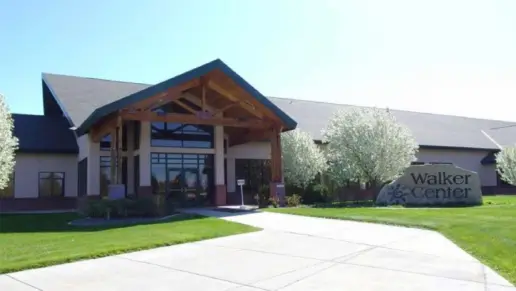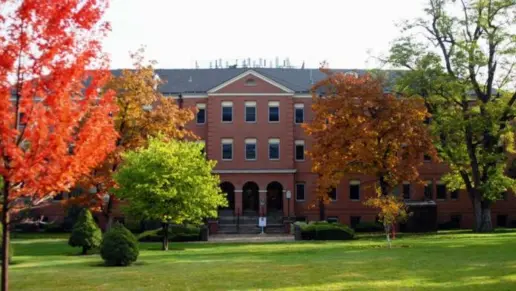North Point was a super helpful and great experience that was monumental in my recovery. The staff and nurses are incredible and very helpful and caring.
About Northpoint Idaho
Northpoint Recovery in Boise, Idaho, provides comprehensive substance addiction and mental health treatment. Your recovery begins with a complimentary assessment to determine your unique needs. They have inpatient and detox services available. They offer a unique plan that uses a three phased approach to care, including detox, rehab and aftercare support.
The drug detox is a medically supervised program that includes 24/7 supervision to ensure safety and comfort. Medication assisted treatment is available to reduce drug cravings and lessen withdrawal symptoms. You’ll also receive holistic care that combines nutrition, hydration therapy and relaxation methods.
Therapeutic support is included in their programs to help you develop healthy coping skills and to give you methods for handling stress and emotional challenges that often accompany addiction.
During your rehab phase, you’ll identify addiction triggers and address behaviors that could lead to relapse. Your therapy sessions will assist with perspective reframing and additional stress relief techniques. Life skills training assists with problem solving and helps you navigate various challenges you may face after initial treatment.
Aftercare is available and meant to be accessible and adaptable. It’s beneficial for integrating recovery resources and tools into everyday life after treatment. These services may include12 step meetings, community support groups and outpatient care.
Family members are involved in the recovery process and are encouraged to attend workshops and therapy that help rebuild relationships and mend communication gaps that addiction can sometimes cause.
Rehab Score
Gallery
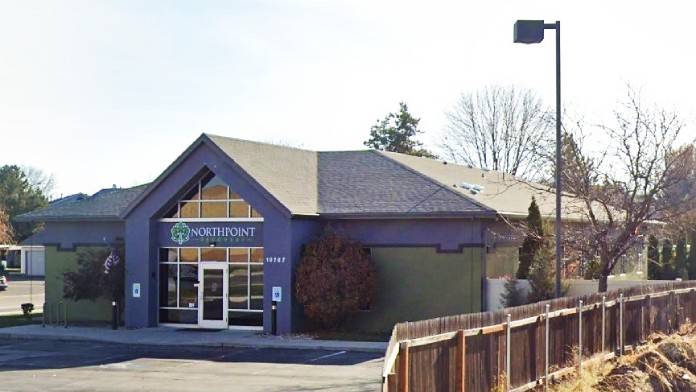

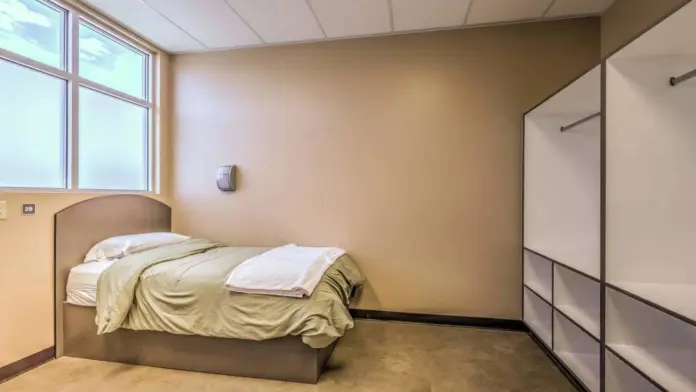
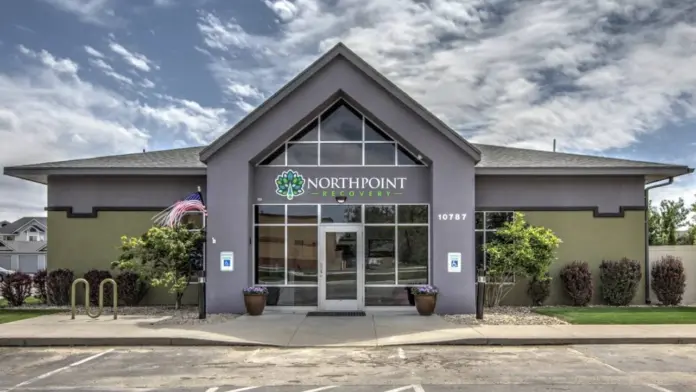
Location
Accepted Insurance




Other Forms of Payment
Private insurance refers to any kind of healthcare coverage that isn't from the state or federal government. This includes individual and family plans offered by an employer or purchased from the Insurance Marketplace. Every plan will have different requirements and out of pocket costs so be sure to get the full details before you start treatment.
Self-pay involves paying for treatment out of your own pocket. You can use savings or credit, get a personal loan, or receive help from family and friends to fund your treatment. If you don't have insurance or your insurance plan doesn't cover a specific program, self-pay can help ensure you still get the care you need.
Addiction Treatments
Levels of Care
Treatments
The goal of treatment for alcoholism is abstinence. Those with poor social support, poor motivation, or psychiatric disorders tend to relapse within a few years of treatment. For these people, success is measured by longer periods of abstinence, reduced use of alcohol, better health, and improved social functioning. Recovery and Maintenance are usually based on 12 step programs and AA meetings.
Drug rehab in Idaho provides treatment for addiction to drugs. It usually includes a combination of treatment methods that can involve counseling, medication, and a variety of evidence-based therapies. Programs are designed to help individuals manage their substance use disorder long-term.
Many of those suffering from addiction also suffer from mental or emotional illnesses like schizophrenia, bipolar disorder, depression, or anxiety disorders. Rehab and other substance abuse facilities treating those with a dual diagnosis or co-occurring disorder administer psychiatric treatment to address the person's mental health issue in addition to drug and alcohol rehabilitation.
A combined mental health and substance abuse rehab has the staff and resources available to handle individuals with both mental health and substance abuse issues. It can be challenging to determine where a specific symptom stems from (a mental health issue or an issue related to substance abuse), so mental health and substance abuse professionals are helpful in detangling symptoms and keeping treatment on track.
Opioid rehabs specialize in supporting those recovering from opioid addiction. They treat those suffering from addiction to illegal opioids like heroin, as well as prescription drugs like oxycodone. These centers typically combine both physical as well as mental and emotional support to help stop addiction. Physical support often includes medical detox and subsequent medical support (including medication), and mental support includes in-depth therapy to address the underlying causes of addiction.
Substance rehabs focus on helping individuals recover from substance abuse, including alcohol and drug addiction (both illegal and prescription drugs). They often include the opportunity to engage in both individual as well as group therapy.
Programs



Clinical Services
Cognitive Behavioral Therapy (CBT) is a therapy modality that focuses on the relationship between one's thoughts, feelings, and behaviors. It is used to establish and allow for healthy responses to thoughts and feelings (instead of unhealthy responses, like using drugs or alcohol). CBT has been proven effective for recovering addicts of all kinds, and is used to strengthen a patient's own self-awareness and ability to self-regulate. CMT allows individuals to monitor their own emotional state, become more adept at communicating with others, and manage stress without needing to engage in substance abuse. One of the goals with CBT is learning to anticipate what problems may arise. Patients learn to be in control of these negative, addictive behaviors. They develop their own coping strategies to learn how to avoid them.
Dialectical Behavior Therapy (DBT) is a modified form of Cognitive Behavioral Therapy (CBT), a treatment designed to help people understand and ultimately affect the relationship between their thoughts, feelings, and behaviors. DBT is often used for individuals who struggle with self-harm behaviors, such as self-mutilation (cutting) and suicidal thoughts, urges, or attempts. It has been proven clinically effective for those who struggle with out-of-control emotions and mental health illnesses like Borderline Personality Disorder.
Group therapy has been shown to be very helpful for those in drug rehab programs. People are often nervous about group therapy. They don't like the idea of sitting down with a group of strangers and talking about personal issues. However, what they usually find is that they're able to learn so much more about themselves. Patients usually experience group therapy in a number of different settings. There may be 12 Step programs, which are group-oriented. There may also be other types of groups that cover various subjects. In listening to others share their stories, patients get to know one another. Over time, trust is built and they feel more comfortable sharing.
All patients who enter a drug rehab center will participate in individual counseling sessions. These sessions are critical in the recovery process. During individual counseling sessions, the therapist will get to know the patient better. Establishing trust is very important. Once the therapist has a better understanding of the patient's addiction, he or she will begin therapy. One of the above methods are often used, or a combination of them. The goal is to understand the reasons behind the addiction. Those root causes are targeted, resulting in a much better, long-term recovery.
Motivational Interviewing (MI) is a clinical approach to helping people with substance abuse issues and other conditions shift behavior in positive ways. It is more goal-oriented than traditional psychotherapy, as MI counselors directly attempt to get clients to consider making behavioral change (rather than wait for them to come to conclusions themselves). Its primary purpose is to resolve ambivalence and help clients become able to make healthy choices freely. Many people who are entering drug rehab find that they lack the needed motivation to recover. Motivational Interviewing (MI) addresses this problem. It can be such a barrier for recovery; even in those who want it. MI allows patients to grasp what they feel is important as a part of their recovery journey. In the process, they are able to overcome denial. They make their own conclusions about their drug use, and they develop a desire to change. That desire comes from within, not from a counselor.
Trauma therapy addresses traumatic incidents from a client's past that are likely affecting their present-day experience. Trauma is often one of the primary triggers and potential causes of addiction, and can stem from child sexual abuse, domestic violence, having a parent with a mental illness, losing one or both parents at a young age, teenage or adult sexual assault, or any number of other factors. The purpose of trauma therapy is to allow a patient to process trauma and move through and past it, with the help of trained and compassionate mental health professionals.
Couples therapy provides the opportunity to discuss challenges in the relationships and learn healthy ways to work through them. Therapy may address issues such as your roles, beliefs, finances, health, substance use, and children.
Eye Movement Desensitization and Reprocessing Therapy (EMDR) has been found to be very effective in treating addiction. It is a new type of psychotherapy that is helpful when trauma is a component of addiction. Patients follow the therapist's hand movements with their eyes. During this time, they are asked to recall a disturbing event in their lives. Eventually, the therapist guides the patient to think about more pleasant events or thoughts. This weakens the effect of negative emotions. Eventually, the disturbing thoughts begin to feel less severe. Patients find that they are more in control of them.
Research clearly demonstrates that recovery is far more successful and sustainable when loved ones like family members participate in rehab and substance abuse treatment. Genetic factors may be at play when it comes to drug and alcohol addiction, as well as mental health issues. Family dynamics often play a critical role in addiction triggers, and if properly educated, family members can be a strong source of support when it comes to rehabilitation. Multidimensional Family Drug Rehabilitation Therapy (MDFT) at Northpoint has been shown to be very effective for young people with addictions. For adolescents with addictions, incorporating this type of treatment is crucial. There are several goals with MDFT. First and foremost is to keep the family together and thriving. Family stability is critical in order for the young person to be successful. Any mental health symptoms are addressed with the appropriate forms of therapy. Mental health conditions are often and underlying cause of addiction. Most families are not aware of this fact.
Part of recovery is replacing unhealthy habits with healthy life skills. These include psychological skills and social skills that allow you to thrive post treatment. While in rehab in Idaho, you'll work on developing these skills so you have the tools you need for a new life.
Chronic substance use leads to biochemical imbalances that contribute to cravings and poor mental health. Nutrition therapy works to restore balance by giving your body the nutrients it needs for optimal performance.
Creativity is inherently healing, and can help those in recovery express thoughts or feelings they might not otherwise be able to. Creative arts therapy can include music, poetry/writing, painting, sculpting, dance, theater, sandplay, and more. Unlike traditional art, the final product matters far less than the experience of creation and expression itself.
Experiential therapy is a form of therapy in which clients are encouraged to surface and work through subconscious issues by engaging in real-time experiences. Experiential therapy departs from traditional talk therapy by involving the body, and having clients engage in activities, movements, and physical and emotional expression. This can involve role-play or using props (which can include other people). Experiential therapy can help people process trauma, memories, and emotion quickly, deeply, and in a lasting fashion, leading to substantial and impactful healing.
Amenities
-
Private Setting
-
Yoga Studio
-
Hiking
Accreditations

The Joint Commission, formerly known as JCAHO, is a nonprofit organization that accredits rehab organizations and programs. Founded in 1951, the Joint Commision's mission is to improve the quality of patient care and demonstrating the quality of patient care.
Joint Commission Accreditation: Yes
Accreditation Number: 570810

The National Association of Addiction Treatment Providers (NAATP) is a professional association that represents organizations in the field of addiction services. Founded in 1978, NAATP's mission is to advance addiction services and ensure that high-quality addiction treatment is available and accessible.
NAATP Member: Yes
Contact Information
2335 E State Ave
Meridian, ID 83642
